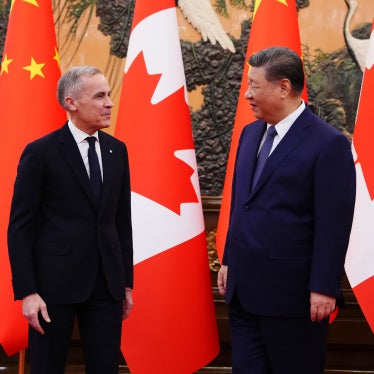I am writing to express our concern regarding the recent repatriation of Guillermo Rigondeaux and Erislandy Lara from Brazil back to their native Cuba. We are very concerned that Brazil did not take sufficient steps to ensure that Rigondeaux and Lara were afforded the legal protections they may have been entitled to as potential refugees. We urge you to investigate whether their rights were adequately protected while they were in Brazil, and to take steps to help ensure that their rights are not violated now that they are back in Cuba.
According to information provided by the Justice Ministry, Rigondeaux and Lara, both boxers, abandoned Cuba’s athletic delegation at the Pan American Games on July 20. On August 2, they contacted the Brazilian military police who, at the request of the National Secretariat of Public Security, turned them over to the federal police. The two men were then held in custody for two days. During this time they gave depositions in which they stated their desire to return to Cuba. According to the Justice Ministry, they were provided with legal counsel when the depositions were taken. They were repatriated to Cuba on August 4.
As you probably know, it is very common for Cuban athletes and artists to seek asylum while traveling abroad. The fact that Rigondeaux and Lara defected from an official Cuban athletic delegation strongly suggests that they may have been interested in seeking asylum in Brazil.
Even if the two athletes did not explicitly request political asylum, claims for refugee status can be signaled through actions, rather than through an explicit request. The United Nations High Commissioner for Refugees (UNHCR) recognizes that a valid refugee claim can occur sur place for individuals who, “as a result of [their] own actions,” have a well-founded fear that they will be persecuted in their home country. The UNCHR Handbook on Procedures and Criteria for Determining Refugee Status states that “[w]here there is reason to believe that a person, due to his illegal departure or unauthorized stay abroad is liable to such severe penalties his recognition as a refugee will be justified.”
The Cuban government, in violation of international law, routinely prosecutes citizens for unauthorized travel, including cases where individuals overstay their authorized visits abroad. Prison sentences run as high as three years. Because they defected from the national athletic delegation, it is reasonable to suspect that Rigondeaux and Lara had a well-founded fear of being persecuted upon their return to Cuba.
Given the possibility that these two athletes were entitled to special protections as potential asylum seekers, we respectfully urge the Brazilian government to take, at a minimum, the following two steps:
First, it should carry out a thorough and impartial investigation into how authorities handled the case of Rigondeaux and Lara. It is important to determine what steps, if any, were taken to guarantee their rights as potential refugees. Were they advised of the possibility of seeking political asylum? Did they have access to independent legal counsel? Were they put in touch with representatives from the UNHCR or the National Council for Refugees?
Second, the Brazilian government should closely monitor how Rigondeaux and Lara are treated by the Cuban government. The Brazilian government should use all the diplomatic measures at its disposal to ensure that the athletes are not subject to any violations of their basic rights by the Cuban government in retaliation for their actions in Brazil.
We appreciate your attention to this urgent matter.
Sincerely,
/s/
José Miguel Vivanco
CC: Mr. Celso Amorim, Minister of Foreign Relations of Brazil








